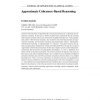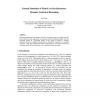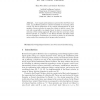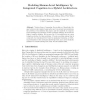102
click to vote
JLP
1998
15 years 2 months ago
1998
Using constraint logic techniques, it is made possible to use a wellknown metainterpreter backwards as a device for generating programs. A metainterpreter is developed, which prov...
111
click to vote
JANCL
2002
15 years 2 months ago
2002
ABSTRACT. It has long been recognized that the concept of inconsistency is a central part of commonsense reasoning. In this issue, a number of authors have explored the idea of rea...
CORR
1998
Springer
15 years 2 months ago
1998
Springer
We focus on the productionof efficient descriptionsof objects, actions and events. We define a type of efficiency, textualeconomy, thatexploitsthe hearer’s recognitionof infe...
IJIS
2002
15 years 2 months ago
2002
Meta-level architectures for dynamic control of reasoning processes are quite powerful. In the literature many applications in reasoning systems modelling complex tasks are descri...
117
click to vote
AI
1999
Springer
15 years 2 months ago
1999
Springer
Reasoning about the physical world is a central human cognitive activity. One aspect of such reasoning is the inference of function from the structure of the artifacts one encount...
AIL
1998
15 years 2 months ago
1998
In the law, it is generally acknowledged that there are intuitive differences between reasoning with rules and reasoning with principles. For instance, a rule seems to lead directl...
101
click to vote
EOR
2002
15 years 2 months ago
2002
Decision trees allow the modeling of event-dependent reasoning, but do not consider the dynamics of contextual changes in reasoning. In the framework of the SART project, which ai...
102
click to vote
CL
2000
Springer
15 years 2 months ago
2000
Springer
Abstract. A new equational foundation is presented for the Fluent Calculus, an established predicate calculus formalism for reasoning about actions. We discuss limitations of the e...
117
click to vote
COGSCI
2004
15 years 2 months ago
2004
Johnson-Laird and coworkers' Mental Model theory of propositional reasoning is shown to be somewhere in between what logicians have defined as "credulous" and "...
121
Voted
KI
2007
Springer
15 years 2 months ago
2007
Springer
Various forms of reasoning, the profusion of knowledge, the gap between neuro-inspired approaches and conceptual representations, the problem of inconsistent data input, and the ma...





